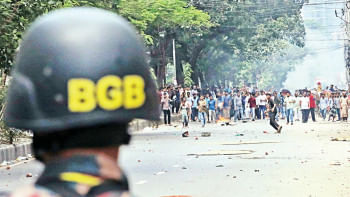The Essence of Baishakh

Biswajit Bhowmik lives in Ghorasal in the Narsindi district with his wife and three daughters. A farmer by profession, he also runs a small convenience shop on the side to help with his livlihood. This year, Bhowmik, like countless other Bengalis, is looking forward to Pahela Baishakh (the Bengali New Year). To him however, this day holds a different significance than it does to those of us residing in the city. Bhowmik looks forward to Baishakh because this is the season his only crop of paddy will be harvested and with it will come an income that will repay his debts, pay his bills and provide for his children. “We don't celebrate in a big way like they do in the city, but we get together with our neighbours, eat sweets, sing some songs and if we can afford it, we wear new clothes, they are not necessarily red and white” says Bhowmik.
This tradition of Pahela Baishakh started many years ago in the Mughal era, under Emperor Jalaluddin Muhammad Akbar, in order to ease agricultural tax collection. He set a date that coincided with harvest sessions and declared all debts would be settled by the end of the month of Choitro. A new year therefore started on the first of Baishakh, when landlords would distribute sweets among tenants and businessmen would open new Halkhatas (account books). This tradition is still widely practiced in villages such as Bhowmik's, where invitations are sent by local businessmen and sweets are eaten together in celebration.
Although Pahela Baishakh has become a largely commercial urban celebration complete with fairs, colour themes and an imitation of what is thought to be traditional rural lifestyle, the ancient practices of New Year still remain in farming communities all over South Asia. The crops are no longer just one type of rice, “We have hybrid crops now, we grow numbers 28, 29 and 14 mostly,” says Bhowmik. Technology is also advanced, but the essence of this festival remains intact- it is a day when economic, educational and religious backgrounds evaporate, uniting Bengalis everywhere, engulfing them in its joy.

 For all latest news, follow The Daily Star's Google News channel.
For all latest news, follow The Daily Star's Google News channel. 



Comments